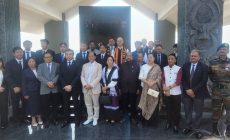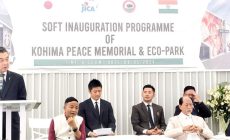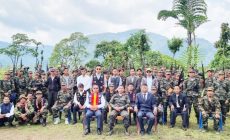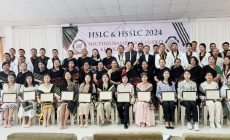Sensitization Campaign on Clean Election held in Patkai
Morung Express News
Patkai | January 31
Time is opportune to make election boring in Nagaland, maintained a member of the Nagaland Baptist Church Council (NBCC)’s Core Committee for Clean Election Movement (CEM).
Addressing a clean election sensitisation campaign held under the theme, ‘Your Stand Decides the Future’ at Patkai Christian College (Autonomous) on January 30, the NBCC’s CEM Convenor, Dr Villo Naleo made the assertion while noting that elections in Nagaland are becoming more lucrative and violent because of money & muscle power, proxy voting, etc.
Such practices, among the most corrupted forms of electioneering system, in a Christian dominated state is “sacrilegious to Christian ethos and principles,” he stated.
Giving a brief history of CEM in Nagaland, Dr Naleo, who is also Dean of Shalom Bible Seminary, informed that the NBCC first decided unanimously to start a campaign against Christians involving in bribery, corruption and other unfair means under the theme: “A Clean and Fair State General Election” in 1975.
“The pioneers have considered it as a spiritual issue. Today, this issue has become a social responsibility of the church,” he said. He further noted that the CEM is neither an emotional reaction nor a political movement.
“Our motive is not to govern… What we want people to do is, if you vote, do it with the right motive, right way and use the right means,” he added.
Dr Naleo also stressed that the movement was not a social service, but a social action seeking to transform the structures of society. He, however, implied that changes would not come about abruptly but gradually, adding: “For the Mizos, it took 30 years to make their elections clean. It may take more than that for us.”
One of the reasons for lack of progress, the Convenor listed, was challenges within the Church itself. “The Church is initiating this movement but the Church itself is not clean and there are some Churches dormant about this initiative,” he said. While all Churches should be fighting together, many think that it is NBCC’s job, he added.
Dr Naleo also located the “clash of the western model of democracy and the tribal understanding of democracy” – One person one vote versus community/clan and family voting system.
As a “young society” in terms of formal encounter with ‘modernity,’ he also noted that the Nagas could be either wanting to mature so fast, or could be imitating others too much, that they lose a “sense of identity, being caught up in the whirlwind of politics, modernity and globalisation.”
Why Clean Election?
Nevertheless, the Convenor asserted that CEM is crucial for Nagaland given the host of undemocratic practices during elections. We came to tell you that proxy voting is ethically and democratically wrong, he said, citing a YouthNet 2018 study showing that students and women cast most proxy votes in the 2018 Election.
As taxpaying citizens via both direct and indirect taxes, the people have a right and responsibility for choosing their representatives, he said. He further maintained that Church and politics are two different social institutions, existing for the welfare of society, and thus bring change from different perspectives.
Dr Naleo also opined that Christians’ involvement in politics is vital to determine crucial social decisions as well as “securing Christian moral principles to thrive in society.” As ‘unclean election’ is the “biggest challenge and problem confronting us today and we can’t shape our future without addressing it,” he added.
Root cause?
Meanwhile, Vitono Gugu Haralu said that youth are a part of the problem, though they play active roles in election. “Corruption starts from home from the demand we put to our parents and desire of wanting more,” the social activist noted.
To this end, she opined that cleaning should start from within. “Anything that you feel is not right, start researching. Anything that you feel right, give more energy,” she advised.
Dwelling on ‘Money Election and Violence,’ youth activist, Kevitho Kera maintained that “corruption starts young in Nagaland” via manipulation of documents and certificates by students for welfare services such as scholarships.
“The moment you do so, you are part of the corruption. Welcome to the world of corruption,” he told the gathering comprising mostly of young students, including many first-time voters.
Again, he asserted that if a person sells votes, he/she has no right to point at bureaucrats, politicians and leaders.
Instead, he called for making informed decision and voting for the ‘right’ candidate or ‘None of the Above,’ if they are not satisfied with the performance of their present representative.
Reviewing and keeping track of the usage of the MLAs Local Area Development Scheme (MLAADS) is good way to assess their performance, he added. Further stressing that voting is a constitutional right, Kera also highlighted the process of ‘tendered vote’ when one ‘s vote is found cast by other.
He also urged the students to refrain from indulging in ‘senseless violence’ during elections as it portrays education in a bad light.
The session, moderated by Erenbeni Ezung, also featured experience as a voter by Actress and former executive, Limasenla Jamir. The starting point for her to taking voting rights seriously was when a person came directly to her to sell her vote.
Meanwhile, the Co-Convenor of NBCC CEM, Rev N Suhuto Chishi underscored that clean election is crucial “for future, for progress, for development of our tiny state which is crippled by corruption.”
One significant role which young people can do is to pledge and cast their vote, to start CEM from the grassroot level, he said, adding: “We should have political vision in order to have a better future. We ourselves have to act to change and the change begins from us.”
The campaign ended with a question-and-answer round with active participation by students and others.







 The last Konyak headhunters of Nagaland
The last Konyak headhunters of Nagaland What Does Your Face Say About Your Health?
What Does Your Face Say About Your Health? An orbiting message of peace
An orbiting message of peace Meet R.N. Ravi, who is mediating peace with the Nagas
Meet R.N. Ravi, who is mediating peace with the Nagas










Leave a Reply
Your email address will not be published. Required fields are marked (required)